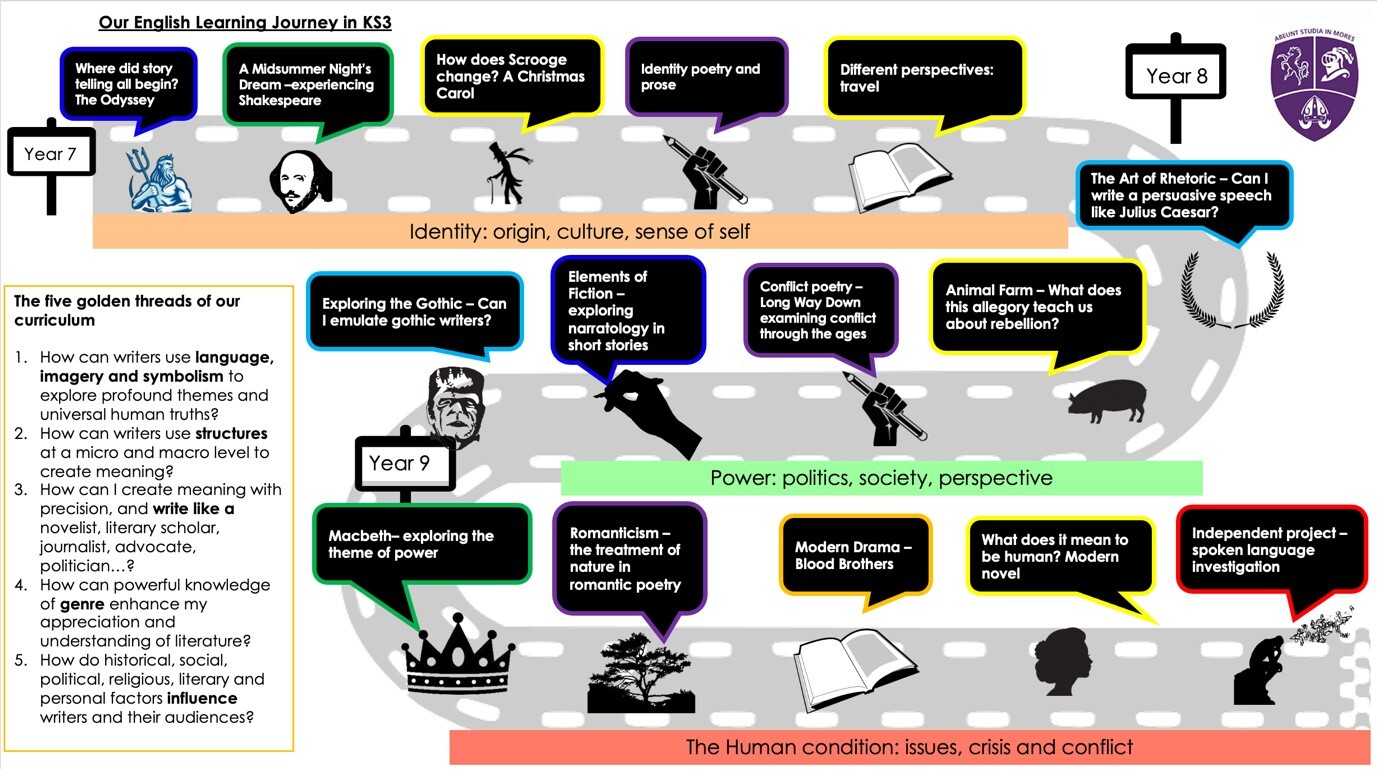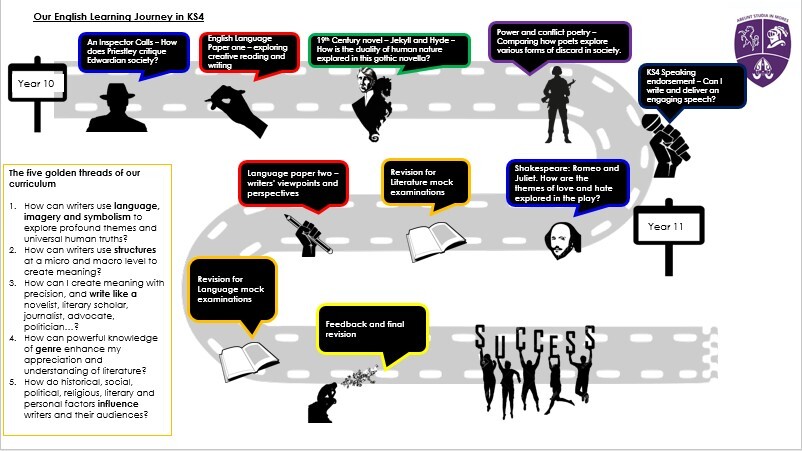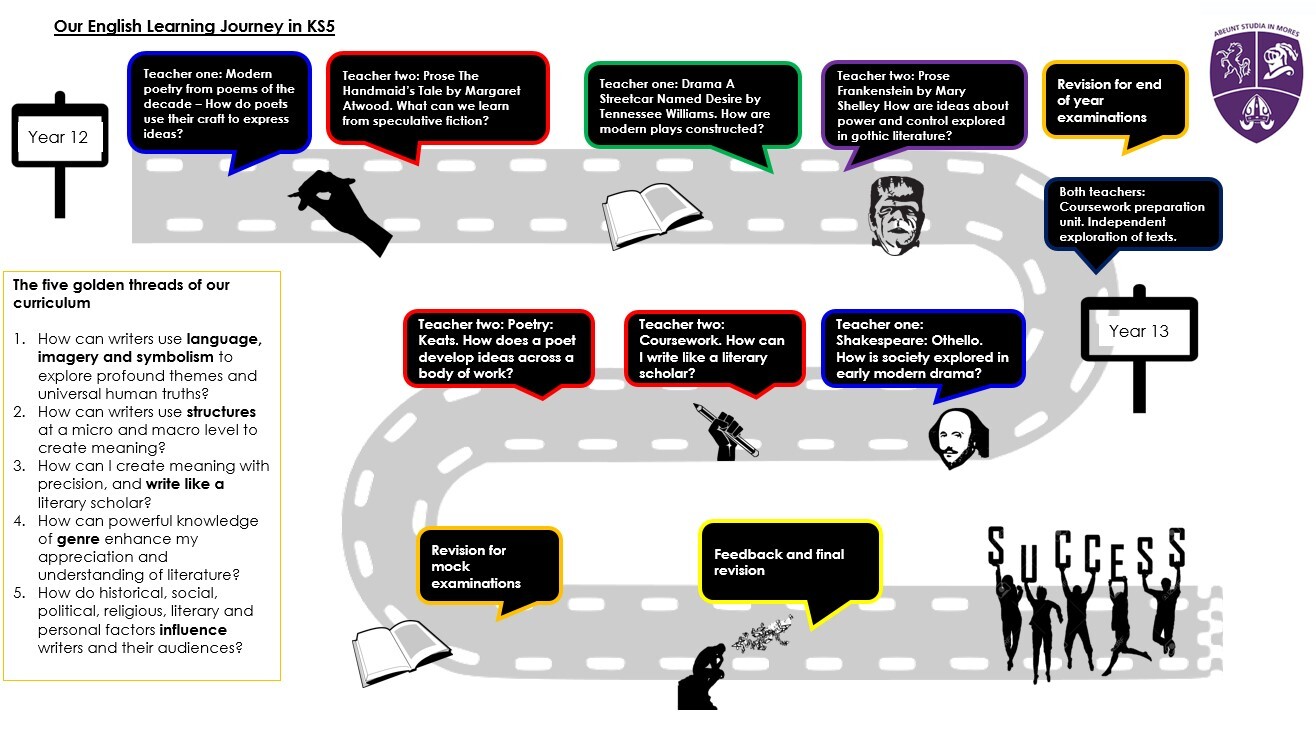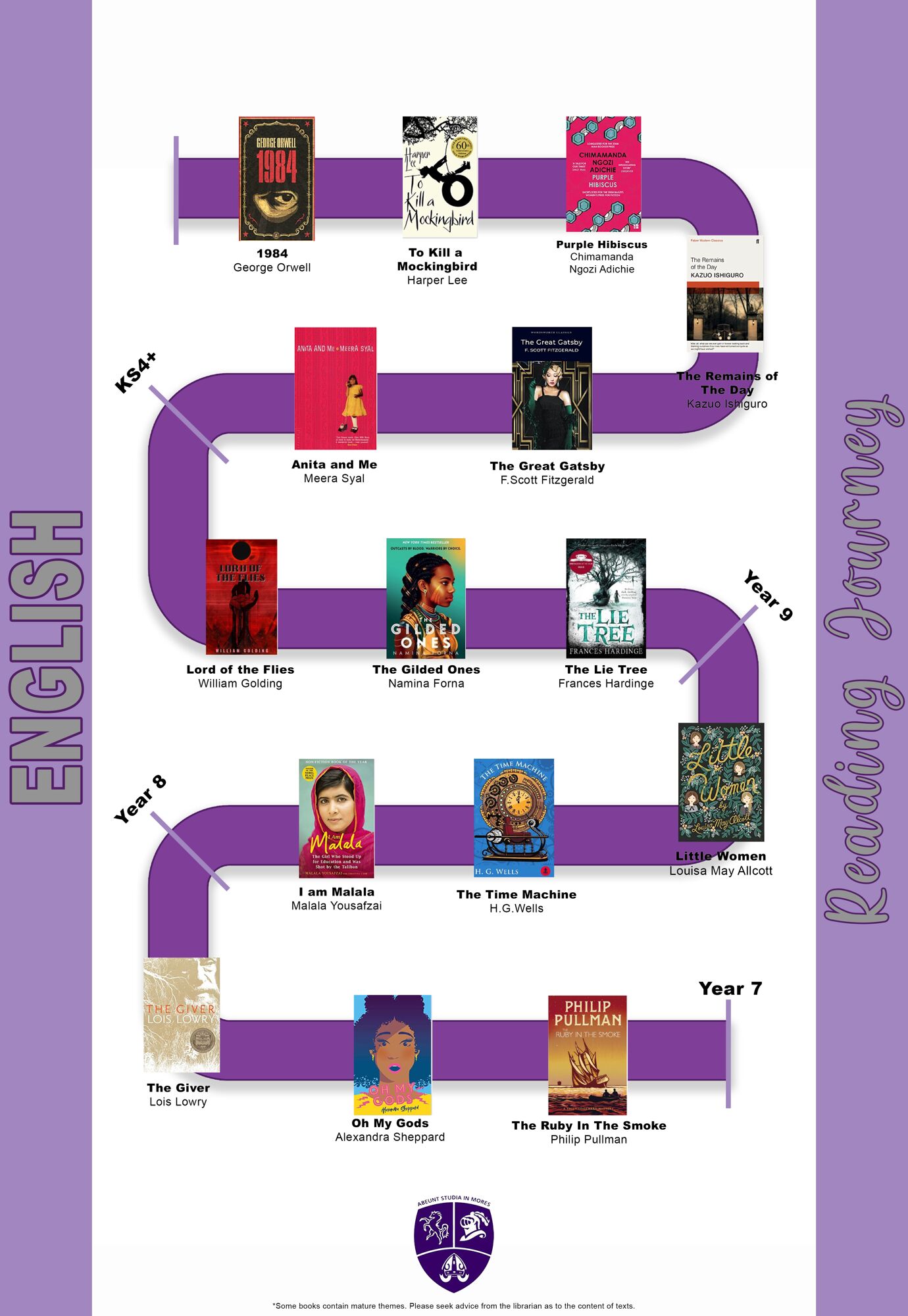- Home
- Academic Excellence
- Subject Information
- English Language and Literature
English Language and Literature

Curriculum Vision
In English, we strive to give our students the knowledge, opportunities and analytical tools to speak, read and write confidently in a range of mediums and situations. Our wish is for students to view literature as the gateway to new ideas and perspectives and the means through which they can satisfy their intellectual curiosity. As such, our curriculum draws on a wide range of texts from different periods, places and traditions.
Curriculum Learning Journey
Key Stage 3

Key Stage 4

Key Stage 5

Curriculum Reading Journey

Summary of Study at each Key Stage
Key Stage 3
In year seven, our units revolve around the central theme of identity. Students begin with our ‘Origins of Literature’ unit, where they grapple with big ideas regarding how humans established their identity in the ancient world. As a creative writing unit, students learn about seminal literature and the ways in which texts act in conversation with one another before being encouraged to use what they have learnt in their own creative pieces. This is followed by a unit on Shakespearean drama, using A Midsummer Night’s Dream as a vehicle through which students can explore comedic convention and early modern theatre. The main focus is to introduce students to analytical writing and understand how Shakespeare was influenced by ancient texts. This unit is followed by a study of 19th century literature, as students explore A Christmas Carol by Charles Dickens. This unit allows students to consolidate both creative writing and analytical skills as well as develop their ability to compare and contrast effectively. We finish the year with students exploring a wide range of powerful poetry and prose that revolves around different views of identity.
In year eight, our units revolve around the central theme of power. Students begin with a foundational unit on ‘The Art of Rhetoric’. This study of oratory is underscored by a speaking competition, in which students deliver their speeches as part of a house tournament. This ensures students not only study the power of language but experience it for themselves, researching, planning, drafting and editing a speech before delivering it in front of their peers. Students then study Animal Farm by George Orwell, considering how persuasion can become a tool for political manipulation. They pick up on the analytical skills they learnt in year 7 and write critically about both character and theme in this text. As we move into the Spring term, students explore poetic form by studying a collection of war poetry alongside the verse novel ‘Long Way Down’ by Jason Reynolds. They are encouraged to consider the power of the individual and society in this module. This is followed by a unit in which students study a collection of short stories. Primarily a unit analysing structure and language in this written form, it also allows students to craft their own creative writing The final short story in the unit links to the next unit students will be studying – the Gothic. Here, students explore the generic conventions of the Gothic through a series of extracts, considering how power is exerted in the supernatural world.
In year nine, our units revolve around human beings in crisis. In the autumn term, students study the Shakespearean drama, Macbeth, building on the knowledge they gained in year 7 of early modern theatre and genre. We build on their analytical writing skills here and develop their responses into sustained essays that utilise of academic diction effectively. This unit is immediately followed by a study of Romantic poetry, with a focus on ideas of nature and rebellion. In the Spring term, students consider the themes of discrimination and what it means to be human by studying a modern play, Blood Brothers by Willy Russell, and modern novel Klara and the Sun by Kazuo Ishiguro. In the former, students can explore how class functions within society. In the latter, students focus on understanding advancing technology in dystopian writing. After the end of year exams, students embark on a unit on journalistic writing, adopting a polemical style to express their viewpoint on the many issues they have encountered throughout the year.
Key Stage 4
In year 10, we begin by studying J. B. Priestley’s An Inspector Calls before moving on to consider the skills needed to tackle English Language paper one. In the spring term, we study a nineteenth century novel, Dr. Jekyll and Mr. Hyde, and interleave this with poems from the ‘power and conflict’ cluster collated by AQA. For our end of year examinations, students are tested on all year 10 content:
English Language paper one – Explorations in creative reading and writing (one hour and forty-five minutes)
English Literature paper one – nineteenth century novel (one hour)
English Literature paper two – Modern texts and poetry (two hours and fifteen minutes)
We finish the year by completing the English language separate spoken language endorsement. This involves students giving a speech on a topic of their choice.
In year 11, we study Shakespeare’s Romeo and Juliet in the Autumn term, whilst interleaving English Language paper one skills so that we are constantly re-visiting knowledge from year 10. In Autumn term two, we complete our Shakespearean study and prepare for the year 11 mock examinations. In English, we split the mocks up so that students are not overburdened. So, at this point in the year they are only tested on English Literature:
English Literature paper one – Shakespeare and nineteenth century novel (one hour and forty-five minutes)
English Literature paper two – Modern texts and poetry (two hours and fifteen minutes)
In the Spring term, we focus on English Language paper two and continue to interleave poetry so that knowledge of both Language and Literature remains fresh. In March, students sit their English Language mock examinations:
English Language paper one – Explorations in creative reading and writing (one hour and forty-five minutes)
English Language paper two – Writers’ viewpoints and perspectives (one hour and forty-five minutes)
Following these final assessments, class teachers revise the content of both English language and Literature thoroughly, focusing on students’ needs.
Key Stage 5
In year 12, for both the AS English Literature course and the A level course, students begin in the first term by studying The Handmaid’s Tale by Margaret Atwood with their first teacher and a collection of modern poetry from the Poems of the Decade with their second teacher. We spend a long time explicitly teaching essay writing skills at the beginning of the course, in order to support students as they transition from GCSE to A level. We also work to engage them with the wider breadth of themes and deeper level of sophistication they will encounter at this level. Alongside the set works, we set up a ‘further reading’ programme. This consists of six texts they will read in their own time alongside the curriculum to deepen their understanding of literature and to allow them to experience a range of diverse and rich texts. Each half term, their teacher will tell them the titles of the texts and they will have the half term to read them ready for an ‘undergraduate’ style seminar in class discussing the major themes/ideas in each text.
In January, the school has an exam week for year 12. In English this will consist of a test on the poetry unit of the course. Students have to answer a question from a choice of two comparing two poems from the cluster.
In the Spring term, students study Frankenstein by Mary Shelley and A Street Car Named Desire by Tennessee Williams.
In the Summer term, students who are on the AS English Literature course sit their final external examinations. Students who are studying A level complete their end of year examinations. These consist of exams on every topic covered in year 12. An outline is below:
Paper one: Poetry and Drama. Two hours. Section A: Compare a named poem from the collection to an unseen poem. Section B: Students answer one question on A Street Car Named Desire.
Paper two: Prose. One hour and fifteen minutes. Students answer one question comparing Frankenstein and The Handmaid’s Tale.
Students also begin the coursework unit for the course. This is worth 20% of their overall grade. Students need to write an essay of a maximum of 3,000 words on two texts. We offer three different pathways through the coursework depending on student’s interest level and ability. Students can either write about two texts which we will teach them in the summer term, they can write about any of the texts they have read as part of the ‘further reading’ programme, or they can choose two texts independently (as long as these are approved by their teacher). Students are encouraged to continue with their coursework over the Summer break.
In Year 13, students begin the year by writing their coursework with their first teacher. We ensure students are given access to a computer room throughout this process and that they receive the support they need as they complete their essay. Pupils are given lesson time on this until the half term break, after which they are expected to complete it on their own. Students hand in a draft to their teacher by Christmas and complete final corrections by February. With their first teacher, they move on to studying a selection of Keats’ poetry. With their second teacher, for the whole of the Autumn term, they study Othello by William Shakespeare.
In the spring term, students complete their units on Keats and Shakespeare as well as handing in their coursework. Staff revise year 12 and 13 units with students so they are fully prepared for their mock examinations which take place in March/April. Following this, staff focus on any areas of weakness and prepare students for their final external A level examinations.
Opportunities Beyond the Classroom
Key Stage 3
We offer a range of opportunities for enrichment to students in key stage three, including theatre trips, literary competitions and year-long clubs. Whether students are interested in learning the art of debate, performance poetry or creative writing, they will find our provision offers something for all and if we do not have a club on an area students are interested in we will look to set one up.
Key Stage 4
Students at KS4 are given the opportunity to take part in the national ‘Speak Out!’ competition run by the Jack Petchey foundation. Alongside this, they can join our debate society or attend one of our trips, either to the theatre or to the annual ‘Poetry Live’ conference which allows them to hear from poets directly.
Key Stage 5
Students in KS5 can become writers or editors of our school magazine ‘The Chronicle’. This is a professionally produced magazine and students learn the skills of writing, establishing content, working to deadlines, editing, liaising with an external agency, photography and graphic design. An electronic version of the magazine is available on the website.Click here for more on The Chronicle
Alongside this, they will be given a chance to visit Keats’ House, attend the theatre to see ‘Othello’ by William Shakespeare and/or ‘A Street Car Named Desire’ by Tennessee Williams and go to a specialised poetry conference focused on their modern poetry unit. They are also welcome to become subject prefects for English.
Assessment
As a department, we feel that feedback should explain clearly what the student is doing correctly and incorrectly, and it should revolve around four main questions: What can the student do? What is the student struggling to do? How does the student’s work compare with that of others? How can the student do better? Students may receive feedback in a number of ways – verbally in the lesson, via written comments in their books, from their peers, as part of low-stakes quizzes which reveal gaps in learning or via the scores they receive for end of unit assessments. All of our unit tests follow the same format and our feedback sheets always specify the class average so students have a benchmark against which they can measure their performance.
Key Stage 3
Formative assessments take place at the teacher’s discretion and are tailored to the specific needs of the students in that class. There is at least one per unit and students will receive ‘whole class feedback’ on this task, followed by some specialist re-teaching of any misconceptions or issues the assessment reveals.
Summative assessments take place at the end of every unit in exam conditions. They are broken in to two parts:
1). Core knowledge from that term in the form of multiple-choice questions and/or short answer qs
2). An extended assessment focusing on the skills developed in that unit
Students receive individualised feedback for these assessments with specific targets as to how they can improve.
Key Stage 4
Formative assessments take place at the teacher’s discretion and are tailored to the specific needs of the students in that class. Formative tasks may include writing one paragraph alone as we build up analytical skills, or it may be an essay set for homework or a task completed in class – it all depends on what suits the pupils. At this level, students appreciate more opportunities to develop their writing and as such we aim to complete three extended tasks per unit. Students will receive feedback in a variety of ways: either they will receive ‘whole class feedback’, followed by some specialist re-teaching of any misconceptions which may have surfaced, or they may peer/self-assess their work, or the teacher may give individualised feedback (verbally or in written form).
Summative assessments take place at the end of every unit in exam conditions. Students are always given advanced warning of when these will take place and the task is a GCSE question on the relevant topic. Students always receive individualised comments from the teacher on this piece of work.
Key Stage 5
Formative assessment takes place at the teacher’s discretion. Staff know their classes well and aim to set essays which are appropriate to their pupils’ needs. Feedback is given more by individual marking at this level, but we may also use peer assessment and/or verbal one-to-one sessions to help students to improve. Summative assessments happen at the end of each unit in timed conditions. All marking is to the A level mark scheme, which appears on our feedback sheets so students can see exactly how they are faring in our subject.
At this level, students are encouraged to complete as many essay tasks in their own time as possible, sometimes using this process to generate ideas about the texts we are studying and at other times using it to improve exam technique. Students are welcome to approach their class teacher with any additional essays they have written and the staff member will either mark the work or verbally discuss it with them.
Additional Reading and Website Recommendations
Key Stage 3
Alongside the subject-specific read map, we have generic reading lists which can be here:
The English department sharepoint area: English-CSGSLive
Key Stage 4
Alongside the subject-specific read map, we have generic reading lists which can be here: CSGS KS4 Reading List 2022-23
Links to websites and recommended revision guides can be found below.
Miss Ballard’s revision website:
Password: Beaumont567
The English department sharepoint area:
Other useful websites:
GCSE POD – A fantastic self-testing website that has quizzes on all the topics we study in English.
MASSOLIT- A website with high level lectures on Literature texts. The school has a subscription to this site so students can set up an account using their school email.
English Language:
Links to useful textbooks and guides:
AQA English Language-Literature Advanced Student Book
AQA English-Language Complete Revision Practice
English Literature
Links to useful textbooks and guides:
An Inspector Calls: AQA English Literature Text Guide
English Literature Unseen Poetry Guide
Key Stage 5
MASSOLIT- A website with high level lectures on Literature texts. The school has a subscription to this site so students can set up an account using their school email.
Links to useful textbooks and guides
Advanced level guides:
Revision Strategies and Materials
Key Stage 3
Students should be independently revising for key English assessments throughout the year. Students should avail themselves of the resources on the CSGS Live page to support them with their revision. They should also refer to their notes and classwork. As with any subject, students should revise actively, not passively; they should not simply read through notes from lessons, but rather should transform these notes into revision resources, or draw upon them to practice their writing.
Students should take particular care to prepare for their end of year examinations. The CSGS Live page includes an end of year examination revision booklet for each year group, featuring guidance, practice questions and information on the format of and expectations for the examinations.
Key Stage 4
Students can attend our booster classes offered throughout the year and can supplement this with use of a variety of electronic resources. Please see suggested activities below:
- Students should learn quotes from the set literature texts throughout year 10 and 11. They should make flashcards and test themselves regularly.
- Student could make mind maps of the major themes and characters in each text to organise their ideas.
- Students can work through the revision activities in these English Language booklets on the school network: https://csgrammar.sharepoint.com/sites/stu-sa/shared documents/English/KS4/English Language
- Students should practice their creative and argumentative writing in timed conditions.
For more revision ideas for English Lang and Lit GCSE then we highly recommend the guide, ‘You can’t revise for English! Yes you can’ by Mark Roberts: You can’t revise for GCSE 9-1 English! Yes you can, and Mark Roberts shows you how: For the 2023 exams (Collins GCSE Grade 9-1 Revision): Amazon.co.uk: Roberts, Mark, Collins GCSE: 9780008392802: Books
Key Stage 5
Students can attend our booster classes offered from January onwards and can supplement this with use of a variety of electronic resources. In particular, we have subscribed to Massolit to aid A level learning, and a good place to start is to watch those videos and take notes (details of website can be found under ‘website recommendations’). Alongside this, please see suggested activities below:
- Students can create a bank of ‘killer quotes’. These are short, memorable quotes which contain powerful language or are structurally significant and can be used in virtually any exam question. Learning these, even though the exam is open book, can save time and build confidence.
- Student could make mind maps of the major themes and characters in each text to organise their ideas.
- Students can use our workbooks to consolidate their learning outside the classroom and make sure there is less chance of needing to ‘cram’ before the exam period. Following this, we do have bespoke revision guides which summarise the essential information for students in one place. Both the workbooks and then revision guides can be found on the school network: https://csgrammar.sharepoint.com/sites/stu-sa/shared documents/English/KS5
- Students should complete as many past papers and sample questions as they can before the final exam, always making sure they adhere to timed conditions.
Subject Specific Equipment Requirements
Key Stage 3
- Pencil
- Writing Pen (Blue/Black)
- Assessment Pens (Red/Purple)
- Rubber
- Ruler
- Personal reading book
Students are welcome to purchase their own copies of the set texts for years 7-9 but they do not have to – we have editions on site they can use.
Key Stage 4
As above, but we also expect students to purchase the set texts for the course so they can make their own annotations. In addition to this, students keep their work in a folder at KS4 and are asked to purchase that themselves. A list of the recommended editions and types of folder are below for your information:
- One A4 Lever arch folder. For an example please see this link: Viking Lever Arch File A4 Portrait 75 mm Blue 2 ring Cardboard Matt Portrait | Viking Direct UK (viking-direct.co.uk)
- A copy of An Inspector Calls by J B Priestley: An Inspector Calls (Heinemann Plays For 14-16+): Amazon.co.uk: J.B. Priestley, Tim Bezant: 8601300267968: Books
- A copy of ‘The Strange Case of Dr Jekyll and Mr Hyde’: Dr Jekyll and Mr Hyde: with The Merry Men & Other Stories (Wordsworth Classics): Amazon.co.uk: Stevenson, Robert Louis, Middleton, Dr Tim, Carabine, Dr Keith: 9781853260612: Books
- A copy of ‘Romeo and Juliet’ by William Shakespeare: Cambridge or Oxford school editions are best: either Oxford School Shakespeare: Romeo and Juliet : Shakespeare, William, Gill, Roma: Amazon.co.uk: Books or Romeo and Juliet (Cambridge School Shakespeare): Amazon.co.uk: Shakespeare, William, Smith, Robert, Gibson, Rex, Wienand, Vicki, Andrews, Richard: 8601404304545: Books
Key Stage5
Students will need their own copy of each Literature text they are studying so that they can make annotations*. The list of appropriate editions is below:
Year 12 A level and AS level:
The Handmaid’s Tale by Margaret Atwood The Handmaid's Tale: The iconic Sunday Times bestseller that inspired the hit TV series: Amazon.co.uk: Atwood, Margaret: 8601404194931: Books
Frankenstein by Mary Shelley Frankenstein (Wordsworth Classics): Amazon.co.uk: Shelley, Mary, Jansson, Dr Siv, Carabine, Dr Keith: 9781853260230: Books
A Street Car Named Desire by Tennessee Williams A Streetcar Named Desire (Modern Classics (Penguin))(Play edition): Amazon.co.uk: Williams, Tennessee, Browne, E., Miller, Arthur: 9780141190273: Books
Poems of the decade Poems of the Decade: An Anthology of the Forward Books of Poetry: Amazon.co.uk: Forward Arts Foundation: 9780571325405: Books
Year 13
Othello by William Shakespeare Othello: Revised Edition (The Arden Shakespeare Third Series): Amazon.co.uk: William Shakespeare, Ayanna Thompson, E. A. J. Honigmann: 9781472571762: Books
Keats’ poetry anthology Selected Poems: Keats: John Keats (Penguin Classics: Poetry): Amazon.co.uk: Keats, John, Barnard, John: 9780140424478: Books
*Please let us know if you need financial support.
Ways in which parents can support students
Key Stage 3
Parents can support their child in finding good books that they love. Children should not see reading as a chore, but as a leisure activity. For this to happen students need to find books that suit their particular interests. Finding the right book for your child is a process that may involve some trial and error. The literacy section of our website has a range of reading lists you could use and a handout on how to support really reluctant readers – this might be a good place to start. Following this, please do contact our librarian or staff if you are in desperate need of some recommendations.
Parents should also aim to create a language-rich environment at home, for example by making family discussion a regular part of the evening routine. Limiting time on devices and encouraging a range of leisure pursuits can also enrich a student’s vocabulary and understanding of the world around them – which then feeds in to their writing.
On a practical level, speaking regularly to your child about their English classwork or homework and encouraging them to use our websites or seek help if they need it would be a welcome supportive measure.
Key Stage 4
On a practical level, students have A4 lever arch folders which are mainly kept in school. Teachers check these to ensure the work is organised but parents can always ask their son/daughter to bring it home on a half-term basis and help them to keep it neat and organised. Alongside this, supervising students as they create flashcards with quotes on them and then helping to test them on these quotes would be a great help. Finally, towards the end of year 10 and again towards each mock period for year 11, students should be sitting past papers in timed conditions. Checking that they have access to the right materials and are setting aside time to complete a paper, (without their mobile phone or any other distracting device), would be beneficial.
Key Stage 5
At this level, students should have a good handle on their learning. Constructive conversations at home where students are asked to articulate what they have been doing in lessons and explain how it is going can be enough to keep students on track. However, if they admit they are struggling or they do not know how to revise effectively, then alerting their form tutor and assisting them to get organised at home is a good place to start. It is also good to encourage students to attend literary events during year 12 and 13 to broaden their understanding of drama and prose. This may include seeing a range of performances at the theatre, going to book launches, attending museum and art exhibitions which relate to texts their reading, or time periods in which these texts are set.